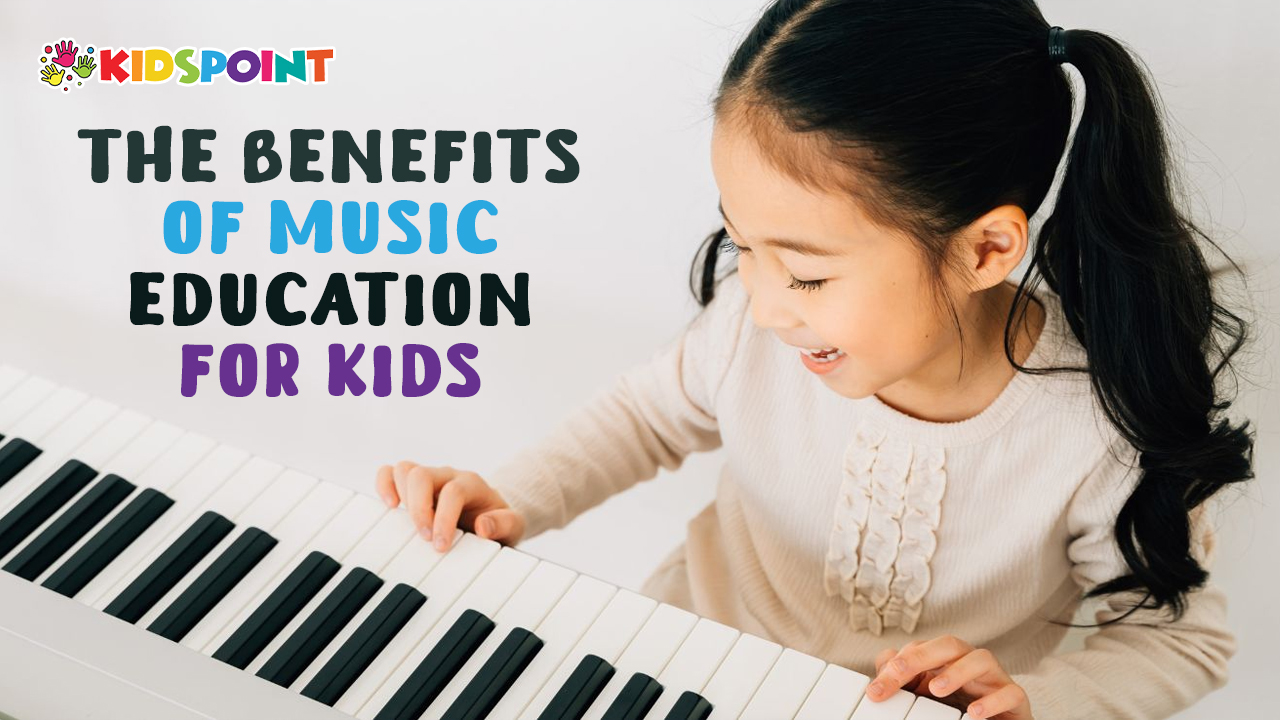In a world where education is often focused on core subjects like math, science, and language arts, the importance of music education for children might sometimes be overlooked. However, delving into the realm of melody and rhythm offers a plethora of benefits that extend far beyond just learning to play an instrument or sing. From cognitive development to emotional well-being, music education plays a significant role in shaping the holistic growth of children. In this comprehensive guide, we’ll explore the myriad advantages that music education brings to young minds and hearts, with a special focus on how The Kids Point integrates music into its educational approach.
Cognitive Development
- Enhanced Academic Performance: Numerous studies have demonstrated a strong correlation between music education and academic achievement. Learning to read music involves complex processes that stimulate various areas of the brain, such as pattern recognition, spatial reasoning, and memory. Consequently, students who engage in music education often exhibit improved performance in subjects like mathematics and language arts.
- Improved Problem-Solving Skills: Playing an instrument involves deciphering musical notation, interpreting symbols, and coordinating physical movements. These activities foster critical thinking and problem-solving abilities in children as they navigate the complexities of musical composition and performance.
- Heightened Spatial Intelligence: Music education involves understanding the spatial arrangement of notes, scales, and chords on a musical staff or instrument. Research suggests that exposure to music enhances spatial intelligence, which can have positive implications for tasks requiring spatial reasoning, such as geometry and engineering.
Emotional Well-Being
- Stress Reduction: Music has the remarkable ability to evoke emotions and soothe the soul. Engaging in musical activities like singing or playing an instrument can serve as a powerful outlet for stress relief, helping children unwind and relax amidst the pressures of academics and daily life.
- Boosted Self-Confidence: Mastering a musical instrument or performing in front of an audience instills a sense of accomplishment and self-assurance in children. As they refine their skills and receive positive feedback from teachers and peers, their confidence levels soar, empowering them to tackle challenges with resilience and poise.
- Emotional Expression: Music serves as a universal language through which children can express their feelings and emotions. Whether through lyrical compositions or instrumental improvisation, young musicians learn to convey joy, sadness, excitement, and a myriad of other emotions, fostering emotional intelligence and empathy.
Social Development
- Collaboration and Teamwork: Music ensembles such as bands, orchestras, and choirs provide children with opportunities to collaborate with peers towards a common artistic goal. Through rehearsals and performances, students learn the importance of cooperation, compromise, and collective responsibility, essential skills that translate into various aspects of life.
- Cultural Awareness and Diversity: Music is deeply intertwined with culture and heritage, reflecting the diversity of human experiences across the globe. By exploring music from different traditions and backgrounds, children gain a deeper appreciation for cultural diversity and develop a broader perspective of the world around them.
- Community Engagement: Music has the power to bring communities together, whether through school concerts, local performances, or cultural events. By actively participating in musical activities, children become integral members of their communities, forging connections and fostering a sense of belonging.
Motor Skills and Coordination
- Fine Motor Skills: Learning to play instruments like the piano, guitar, or violin requires precise control and coordination of hand movements. As children practice scales, chords, and melodies, they refine their fine motor skills and dexterity, which can have positive implications for activities such as writing, typing, and crafting.
- Gross Motor Skills: In addition to fine motor skills, music education also enhances gross motor skills through activities like dancing, marching, and conducting. Whether swaying to the rhythm of a song or keeping pace with a musical beat, children develop a sense of rhythm and coordination that translates into improved physical abilities.
Discipline and Time Management
- Commitment to Practice: Mastering a musical instrument requires dedication, discipline, and regular practice. By establishing a consistent practice routine, children learn the value of perseverance and the rewards of gradual improvement over time.
- Time Management Skills: Balancing music lessons, rehearsals, and performances alongside academic responsibilities teaches children valuable time management skills. They learn to prioritize tasks, manage their schedules efficiently, and allocate time effectively to achieve their goals.
Music education offers a myriad of benefits that enrich the lives of children in profound ways. From cognitive development and emotional well-being to social skills and physical coordination, the impact of music extends far beyond the confines of the classroom. By embracing music as an integral part of education at The Kids Point, we nurture the holistic growth of young minds and hearts, empowering them to thrive in a harmonious symphony of learning and life. As educators, parents, and advocates, let us continue to champion the transformative power of music in shaping the future generation.


